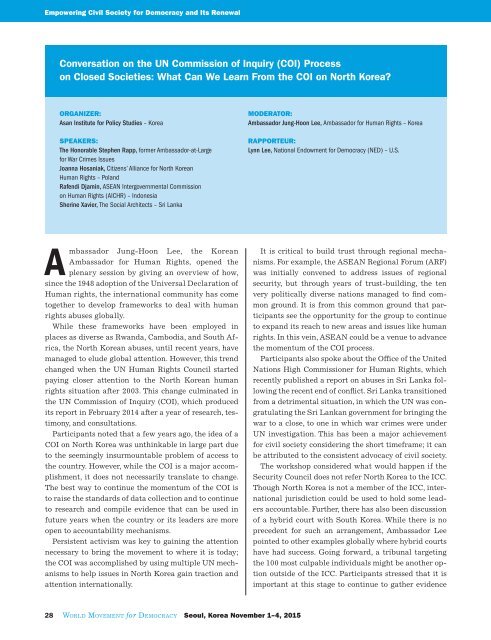Create successful ePaper yourself
Turn your PDF publications into a flip-book with our unique Google optimized e-Paper software.
Empowering Civil Society for Democracy and Its Renewal<br />
Conversation on the UN Commission of Inquiry (COI) Process<br />
on Closed Societies: What Can We Learn From the COI on North Korea?<br />
ORGANIZER:<br />
Asan Institute for Policy Studies – Korea<br />
SPEAKERS:<br />
<strong>The</strong> Honorable Stephen Rapp, former Ambassador-at-Large<br />
for War Crimes Issues<br />
Joanna Hosaniak, Citizens’ Alliance for North Korean<br />
Human Rights – Poland<br />
Rafendi Djamin, ASEAN Intergovernmental Commission<br />
on Human Rights (AICHR) – Indonesia<br />
Sherine Xavier, <strong>The</strong> Social Architects – Sri Lanka<br />
MODERATOR:<br />
Ambassador Jung-Hoon Lee, Ambassador for Human Rights – Korea<br />
RAPPORTEUR:<br />
Lynn Lee, National Endowment for Democracy (NED) – U.S.<br />
Ambassador Jung-Hoon Lee, the Korean<br />
Ambassador for Human Rights, opened the<br />
plenary session by giving an overview of how,<br />
since the 1948 adoption of the Universal Declaration of<br />
Human rights, the international community has come<br />
together to develop frameworks to deal with human<br />
rights abuses globally.<br />
While these frameworks have been employed in<br />
places as diverse as Rwanda, Cambodia, and South Africa,<br />
the North Korean abuses, until recent years, have<br />
managed to elude global attention. However, this trend<br />
changed when the UN Human Rights Council started<br />
paying closer attention to the North Korean human<br />
rights situation after 2003. This change culminated in<br />
the UN Commission of Inquiry (COI), which produced<br />
its report in February 2014 after a year of research, testimony,<br />
and consultations.<br />
Participants noted that a few years ago, the idea of a<br />
COI on North Korea was unthinkable in large part due<br />
to the seemingly insurmountable problem of access to<br />
the country. However, while the COI is a major accomplishment,<br />
it does not necessarily translate to change.<br />
<strong>The</strong> best way to continue the momentum of the COI is<br />
to raise the standards of data collection and to continue<br />
to research and compile evidence that can be used in<br />
future years when the country or its leaders are more<br />
open to accountability mechanisms.<br />
Persistent activism was key to gaining the attention<br />
necessary to bring the movement to where it is today;<br />
the COI was accomplished by using multiple UN mechanisms<br />
to help issues in North Korea gain traction and<br />
attention internationally.<br />
It is critical to build trust through regional mechanisms.<br />
For example, the ASEAN Regional Forum (ARF)<br />
was initially convened to address issues of regional<br />
security, but through years of trust-building, the ten<br />
very politically diverse nations managed to find common<br />
ground. It is from this common ground that participants<br />
see the opportunity for the group to continue<br />
to expand its reach to new areas and issues like human<br />
rights. In this vein, ASEAN could be a venue to advance<br />
the momentum of the COI process.<br />
Participants also spoke about the Office of the United<br />
Nations High Commissioner for Human Rights, which<br />
recently published a report on abuses in Sri Lanka following<br />
the recent end of conflict. Sri Lanka transitioned<br />
from a detrimental situation, in which the UN was congratulating<br />
the Sri Lankan government for bringing the<br />
war to a close, to one in which war crimes were under<br />
UN investigation. This has been a major achievement<br />
for civil society considering the short timeframe; it can<br />
be attributed to the consistent advocacy of civil society.<br />
<strong>The</strong> workshop considered what would happen if the<br />
Security Council does not refer North Korea to the ICC.<br />
Though North Korea is not a member of the ICC, international<br />
jurisdiction could be used to hold some leaders<br />
accountable. Further, there has also been discussion<br />
of a hybrid court with South Korea. While there is no<br />
precedent for such an arrangement, Ambassador Lee<br />
pointed to other examples globally where hybrid courts<br />
have had success. Going forward, a tribunal targeting<br />
the 100 most culpable individuals might be another option<br />
outside of the ICC. Participants stressed that it is<br />
important at this stage to continue to gather evidence<br />
28 World Movement for Democracy Seoul, Korea November 1–4, 2015


